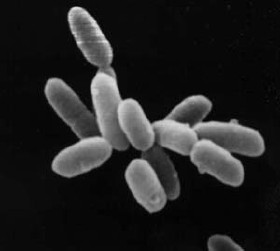
In response to our recent reprise of “Are viruses alive?”, a friend writes to draw our attention to a passage from Carl Woese (1928-2012), who first identified the archaea as a separate kingdom of life: in a paper:
During the past few years, an even more astonishing example has come to light, prompted in part by the attempt to find the cause of colony collapse disorder—the dramatic reduction in the honey bee population (in the United States, losses of adult workers were 23% during 2006- 2007 and 36% during 2007–2008) (124). One of the potential pathogenic causes, the Israeli acute paralysis virus, was found to be able to integrate harmlessly its genome into that of the bee host, and thus confer immunity on the host to further infection. The surprise is that this virus is not a retrovirus: It does not need to integrate itself into the host genome in order to replicate, and so it lacks the genetic machinery for reverse transcription of its RNA into the host DNA. It is not currently known, therefore, how the Israeli acute paralysis virus was able to work its way into the host genome. This is not an isolated example: It is now known that a similar process has occurred in at least 19 vertebrate species, the relevant viruses that have conferred immunity being the lethal Bornavirus and Ebolavirus (125, 126). It seems that this mechanism is a eukaryotic analog to lysogeny in microbes. These findings support the notion that there are collective interactions between viruses and their hosts. – Nigel Goldenfeld and Carl Woese, Life is physics: evolution as a collective phenomenon far from equilibrium (2010), (paywall) More.

Abstract: Evolution is the fundamental physical process that gives rise to biological phenomena. Yet it is widely treated as a subset of population genetics, and thus its scope is artificially limited. As a result, the key issues of how rapidly evolution occurs, and its coupling to ecology have not been satisfactorily addressed and formulated. The lack of widespread appreciation for, and understanding of, the evolutionary process has arguably retarded the development of biology as a science, with disastrous consequences for its applications to medicine, ecology and the global environment. This review focuses on evolution as a problem in non-equilibrium statistical mechanics, where the key dynamical modes are collective, as evidenced by the plethora of mobile genetic elements whose role in shaping evolution has been revealed by modern genomic surveys. We discuss how condensed matter physics concepts might provide a useful perspective in evolutionary biology, the conceptual failings of the modern evolutionary synthesis, the open-ended growth of complexity, and the quintessentially self-referential nature of evolutionary dynamics. [color emphasis added]
Also from Britannica:
Woese proposed a new model to replace the standard Darwinian theory of common descent—that all life on Earth evolved from a single cell or pre-cell. Woese proposed instead that various forms of life evolved independently from as many as several dozen ancestral pre-cells. A 2004 paper further postulated that Darwinian natural selection did not become a factor in evolution until more complex life-forms evolved. Woese argued that in the early stages of the development of life, all organisms engaged in horizontal gene transfer and were not in competition.
Woese made clear that he was not a Darwinian. But, given his status, he was easier to just ignore than attack.
The problem he raises is hard to ignore: At what point does marshaling support for a failing concept like Darwinism (or, if you like, neo-Darwinism or the modern evolutionary synthesis or some other PC face-saver*) get in the way of productive research? If Darwin’s finches and bluster are any indicator of what they have got, that point is probably well past.
* Note: Claim: Evolutionists do not use the term “Darwinism.” Yes they do. This is just another word game.
See also: Why viruses are not considered to be alive
New paper hopes to “salvage the concept of fitness”
Engineering Tradeoffs and the Vacuity of “Fitness”
and
Special issue of Biology: Evolution Beyond Selection will be open access